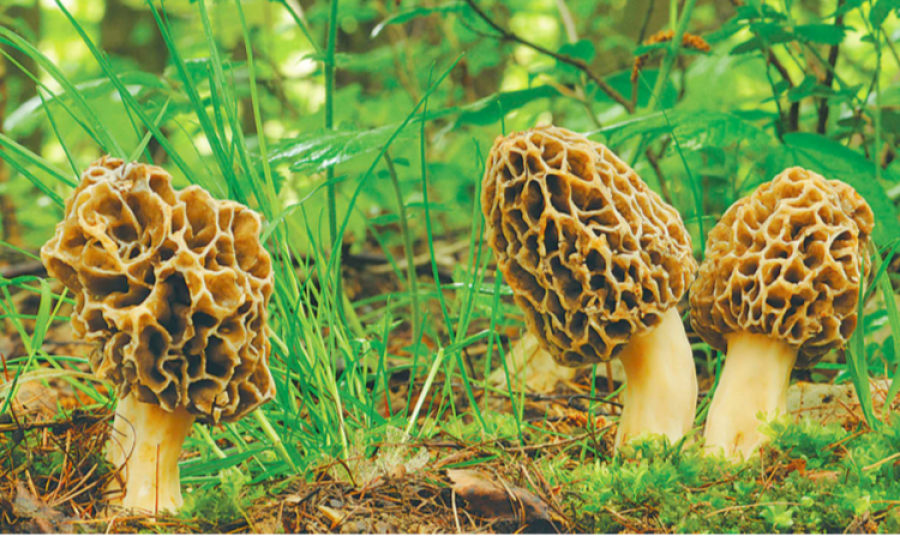Money
Mugu villagers swarm into nearby forests to pick wild mushrooms
Locals say they earn enough money from the annual harvest to get them through the year.
Raj Bahadur Shahi
Hari Shobha Shahi of Soru rural municipality in Mugu has been busily harvesting morel mushrooms in the forests nearby despite the lockdown.
For the last two weeks, she has been spending the whole day picking the wild mushrooms, locally known as 'guchchi'. It is one of the most expensive mushrooms in the world, and grows in the Himalayan region during the rainy season.
Her neighbour Kala Shahi too has been keenly collecting wild mushrooms. For many people in Mugu in the mid-western Himalaya, the plant provides both food and a tidy income.
Morel mushrooms, whose scientific name is Morchella esculenta, have a huge market internationally despite their high price tag. According to reports, a kilogram of the delicious vegetable can cost up to Rs30,000 in the global market.
"We make enough money to pay for our expenses for the whole year by selling the mushrooms we pick during this season," said Hari Shobha, adding that her income had been increasing every year as the fungus is so widely sought after.
It grows under hardwoods and conifers during a short period in the spring, depending on the weather.
Most of the villages in Soru are deserted with the entire population having left for the forests to collect the wild mushrooms.
Kala said that she was able to collect 150 to 200 mushrooms daily. "Since school is closed, everybody from children to elderly people are going to the forests daily. All the family members are picking 100 to 150 grams of mushrooms per day."
Ganga Devi Shahi of Tajagaon said that she had no time for herself as she was busy picking mushrooms. Eight members of her family go to the nearby community forest to collect the plants.
All villages—Fotu, Ner, Taza, Libru, Sorukot, Banjaha, Dhankot, Kalai, Rara and Rumla—are empty with the start of the mushroom picking season.
"As the farming work has been completed, crowds have increased in the forests to pick mushrooms," she said. "The impact of the lockdown in the villages is zero."
According to locals, the guchchi mushroom harvest this year is good due to heavy snow and rain. "They have been requested to collect mushrooms with care," said Dabal Bahadur Shahi, ward head of Soru rural municipality-4.
"Volunteers have been mobilised to minimise crowds in the community forests," he said. "We have also distributed masks, sanitisers and soap to all households to prevent the spread of the coronavirus."
According to the Division Forest Office, mushrooms grow at altitudes between 2,900 and 3,300 metres. They are collected in Mugu from March to April, said Bharat Bahadur Budhathapa, head of the Division Forest Office.
Guchchi mushrooms are found in forests containing nigalo and pipal trees. According to the office, the forests of Rararum, Gilaha, Ner, Kalailek, Magri and Pina villages are a storehouse of guchchi mushrooms.
The fungus comes in two colours—black and yellow. Black mushrooms are in high demand abroad, so they fetch higher prices, Budhathapa said.
Mushrooms are sold in the local market at Rs5 iteach and Rs7,000 per kg. According to traders, India and Tibet, China are the largest importers.
Guchchi mushrooms are sold in the Indian market for up to Rs25,000 per kg, said Kamal Malla, a local trader. Locals sell the mushrooms collected from the forest after drying them in the sun for a few days.
"Due to the virus closure, there will be some problems in the mushroom trade this year," he said. If the lockdown gets extended, the harvest will be sold in July.
According to the office, about 35 quintals of mushrooms are produced in the district annually. The government collects a tax of Rs300 per kg of mushrooms. "The price of guchchi is increasing as it tastes good and is used in the treatment of various diseases," said Budhathapa.




 9.83°C Kathmandu
9.83°C Kathmandu.jpg)















